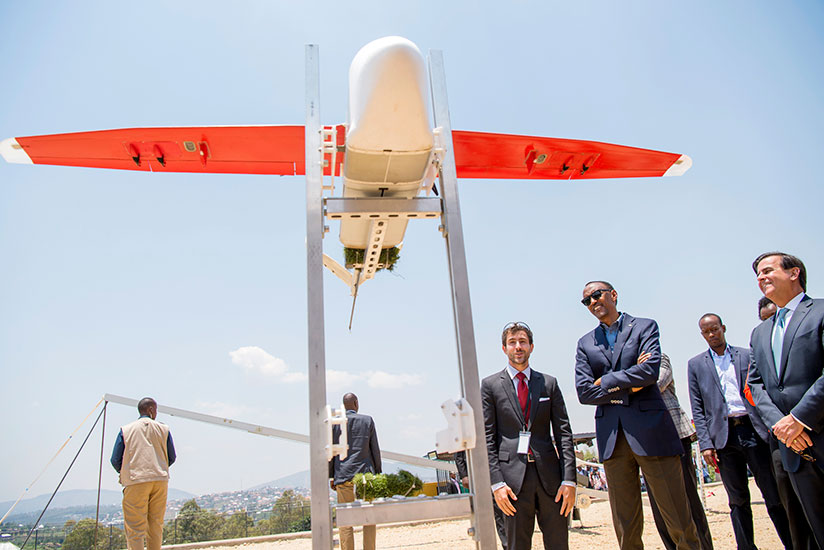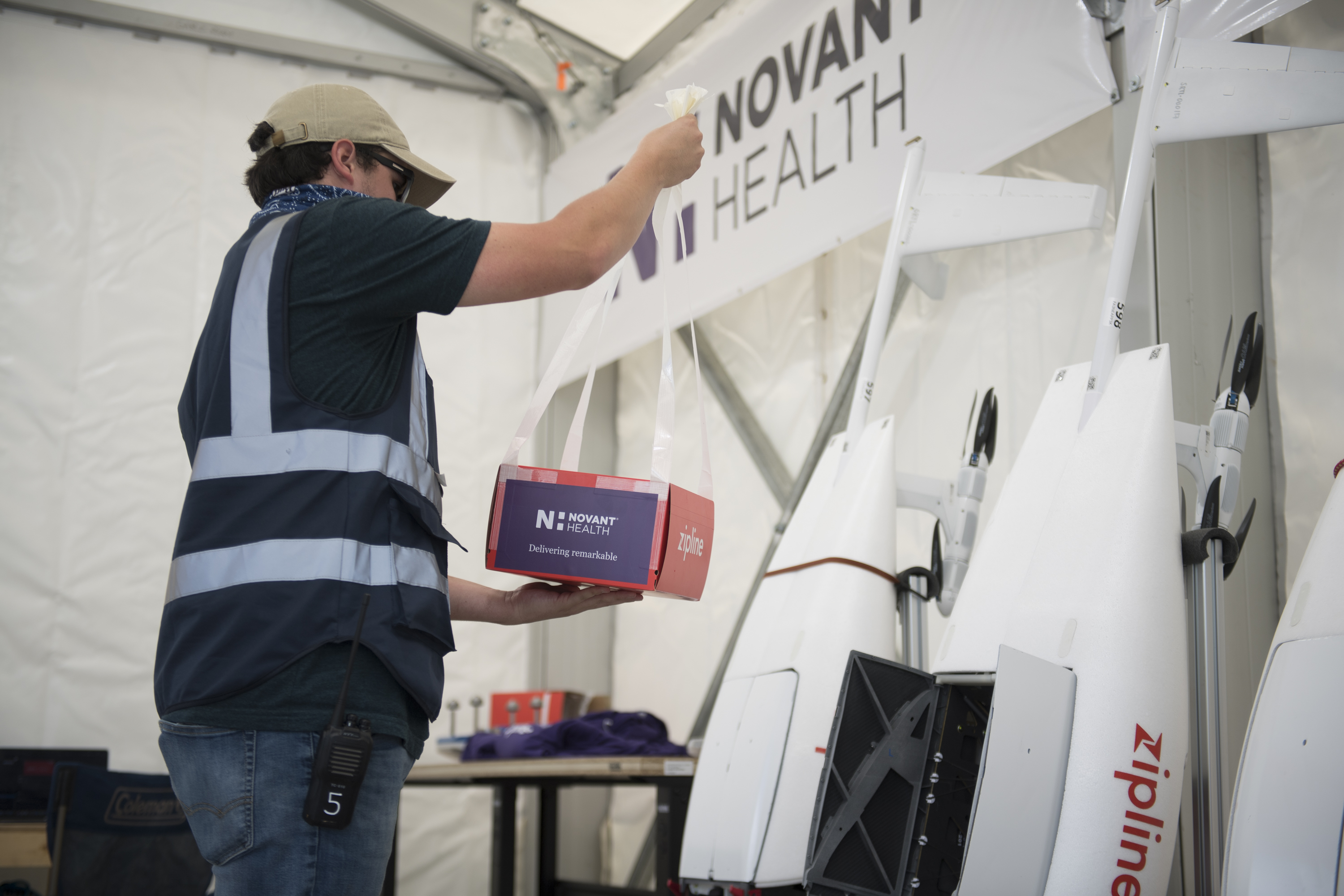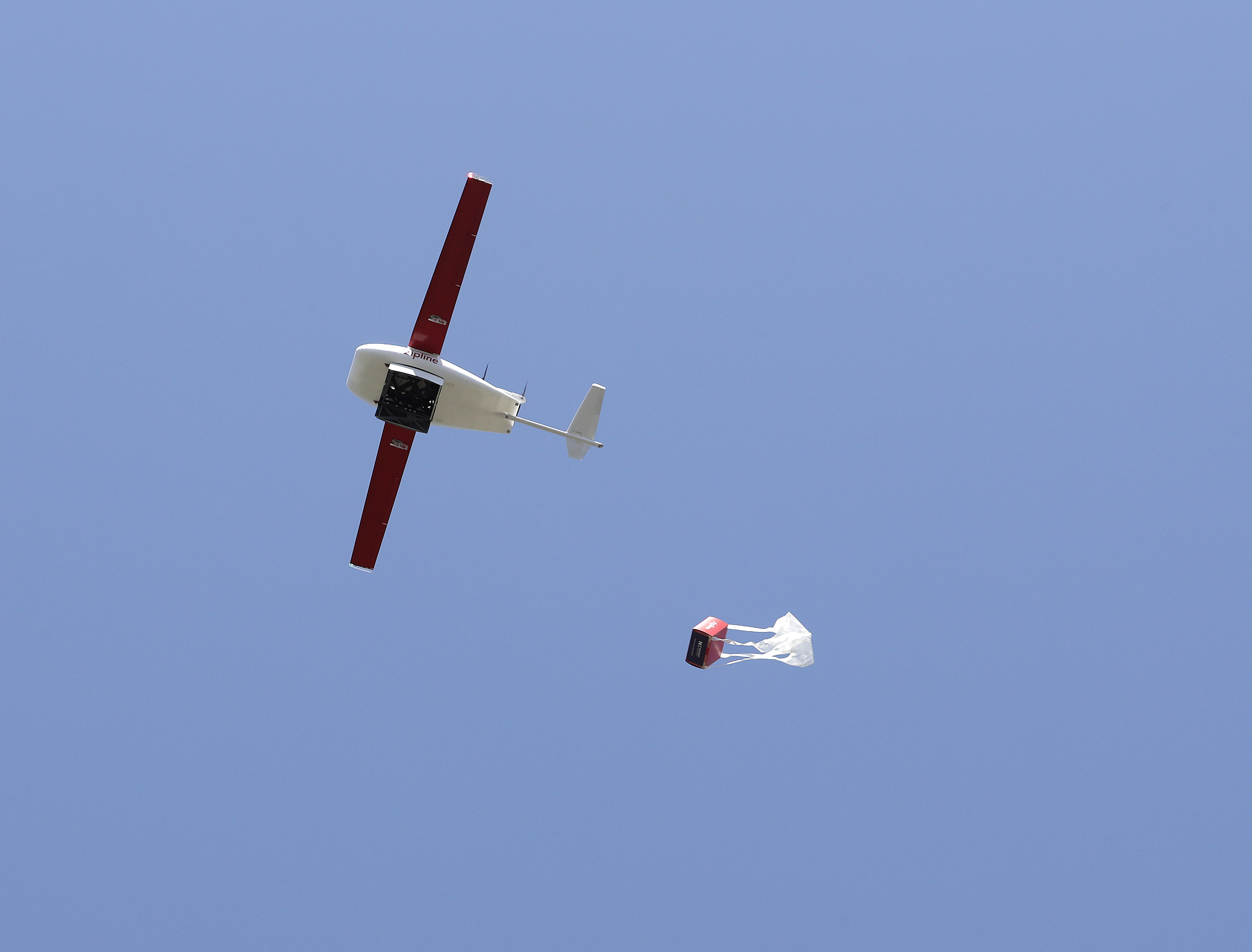Zipline begins US medical delivery with UAV program honed in Africa
Drones are being deployed in the fight to curb COVID-19 in the U.S.
Novant Health and California based UAV delivery startup Zipline have launched distribution of personal protective gear and medical equipment in North Carolina.
Novant is a non-profit healthcare provider with a network in the Southeastern United States.
Through the partnership, Zipline's drones will make 32 mile flights on two routes between Novant Health's emergency drone fulfillment center in Kannapolis to the company's medical center in Huntersville, North Carolina - where front line healthcare workers are treating coronavirus patients.
Zipline and Novant are touting the arrangement as the first authorized long-range drone logistics delivery flight program in the U.S. The activity has gained approvals by the U.S. Federal Aviation Administration and North Carolina's Department of Transportation - though the FAA offered TechCrunch nuanced guidance on how it classifies the undertaking.
The story behind the Novant, Zipline UAV collaboration has a twist: the capabilities for the U.S. operation were developed primarily in Africa. Zipline has a test facility in the San Francisco area, but spent several years configuring its drone delivery model in Rwanda and Ghana.
Co-founded in 2014 by Americans Keller Rinaudo, Keenan Wyrobek and Will Hetzler, Zipline designs its own UAVs, launch and landing systems and logistics software for distribution of critical medical supplies.
The company turned to East Africa in 2016, entering a partnership with the government of Rwanda to test and deploy its drone service in that country. Zipline went live with UAV distribution of life saving medical supplies in Rwanda in late 2016, claiming the first national drone-delivery program at scale in the world.

Zipline co-founder Keller Rinaudo (L) with Rwandan President Paul Kagame (Middle) in 2016
The company expanded to Ghana in 2016, where in addition to delivering blood and vaccines by drone, it now distributes COVID-19 related medication and lab samples.
Based on its Africa operations, Zipline was selected by regulators to participate in medical drone delivery testing in the U.S. in 2016, in coordination with the FAA.
The company's Africa business also led to its pandemic response partnership with Novant Health. The North Carolina based company was in discussion with Zipline on UAV delivery before the coronavirus outbreak in the U.S., but the crisis spurred both parties to speed things up, according to Hank Capps, a Senior Vice President at Novant.
That included some improvisation. For its current launch site the operation is using space donated by a local NASCAR competition team, Stewart-Haas Racing.
According to Capps, the current collaboration using drones to deliver medical supplies from that site could grow beyond the 32 mile route Zipline and Novant began flights on last Friday.
Right now we plan to expand it geographically within our footprint, which is fairly large within North Carolina, South Florida, and Virginia," he told TechCrunch on a call.
That, of course, will depend on regulatory approval. The FAA granted Novant Health permission to operate the current program - which the FAA classifies as a distribution vs. delivery operation - through a 107 waiver. This rolls up into the evolving federal code on operation of unmanned aircraft in the U.S. and allows Novant and Zipline to operate until Oct. 31, 2020, or until all COVID-related restrictions on travel, business and mass gatherings for North Carolina are lifted, whichever occurs first," according to the FAA. The U.S. regulatory body also stipulated that Part 107 is a waiver, not a drone licence."
The FAA offered cautious confirmation that the Zipline, Novant partnership is the first approved long range unmanned delivery service in the United States.
I am not aware of any that are flying routes as far as what they are doing in North Carolina, but I try to be careful when talking about firsts," an FAA spokesperson told TechCrunch.
Last month UPS and CVS announced a shorter range drone delivery program of prescription drugs to a retirement village in Florida.

Image Credits: Novant Health
The arrangement between Zipline and Novant is not for financial gain - according to both parties - but still supports Zipline's profitability thesis advanced by co-founder Keller Rinaudo.
Healthcare logistics is a $70 billion global industry, and it's still only serving a golden billion on the planet," he told me in a 2016 interview.
On a recent call, Rinaudo noted the startup is generating income on operations to serve that market, through the company doesn't release financial data.
At the distribution centers that have been operating for more than a year, Zipline is making money on the deliveries that we do," he said.
Rinaudo pointed to the more favorable margins of autonomous delivery using small, electric powered UAVs versus large internal combustion vehicles.
I think that these kinds of services are going to operate, much more profitably than traditional logistic services," he said.
Zipline sold investors on that value proposition. The company has raised (a reported) $233 million in VC from backers including Andreeson Horowitz and Goldman Sachs. Zipline intends to expand its drone delivery business in the U.S. and anywhere in the world it finds demand, according to its CEO.
In addition to partner Novant Health, Zipline has caught the attention of big logistics providers, such as UPS - which has supported (and studied) the startup's Africa operations back to 2016.
The Zipline, Novant launch of UAV delivery of medical supplies in the U.S. is a high-point for the thesis that Africa's tech ecosystem - which has become a hotbed for VC and startups - can produce innovation with global application.
The presidents of Rwanda and Ghana - Paul Kagame and Nana Akufo-Addo - were instrumental in supporting Zipline's partnerships in their countries. Other nations on the continent, such as Kenya, South Africa, and Zambia, continue to advance commercial drone testing and novel approaches to regulating the sector.

Image Credits: HHP/Harold Hinson
For all the talk that COVID-19 may force an isolationist shift across countries, the Zipline, Novant Health partnership is very much a globally incubated solution - applied locally in the U.S. - to an international problem.
The program combines a medical drone delivery startup founded in San Francisco with a model tested in Africa to an American healthcare venture in North Carolina, with a little help from a NASCAR race team. This could reflect the unique application of tech and partnerships to come in the fight against COVID-19.
